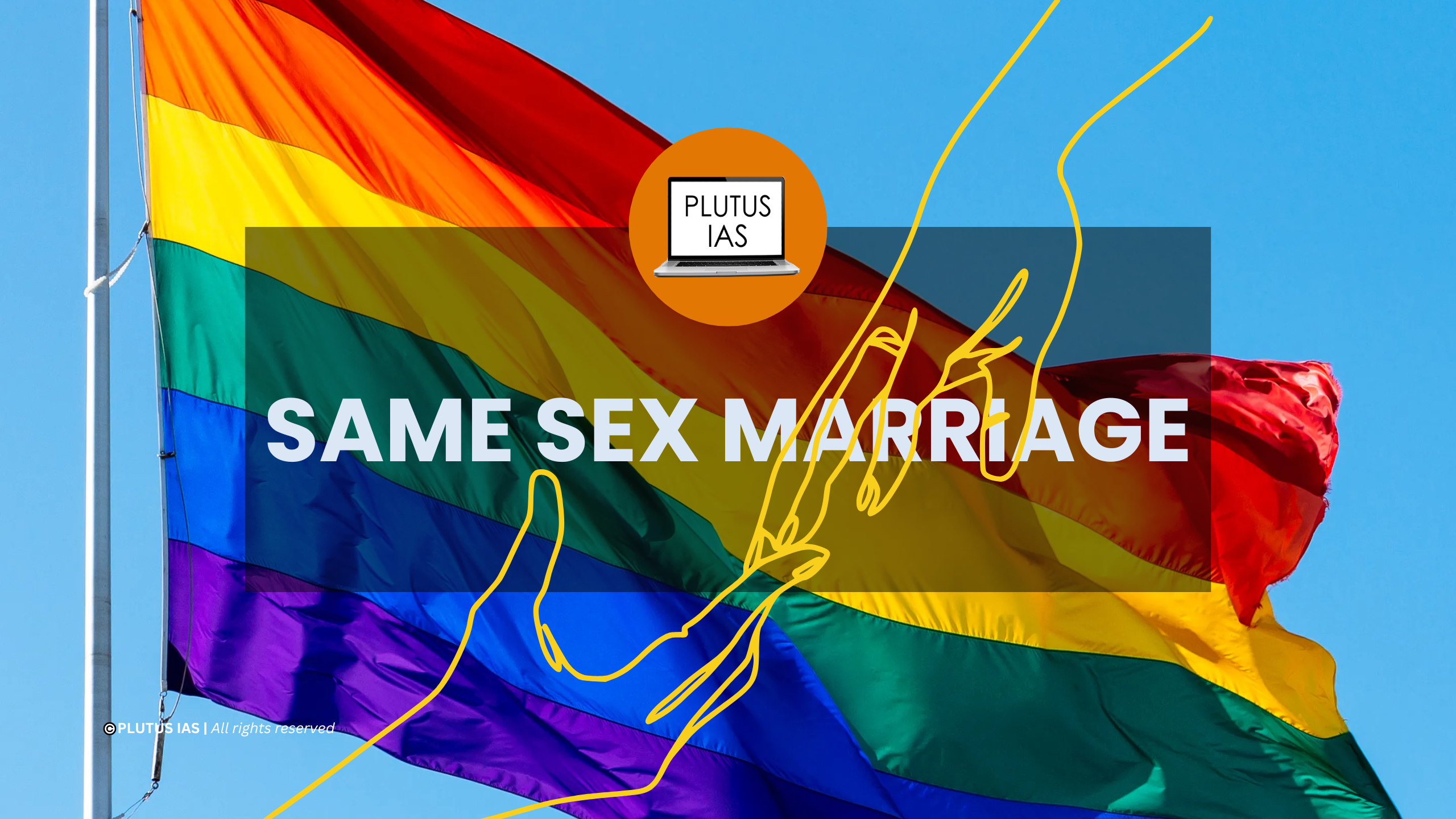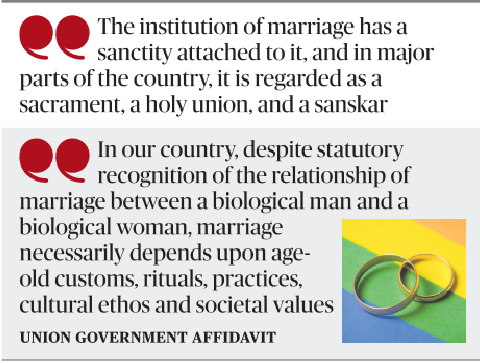13 Mar SAME-SEX MARRIAGE
Same-Sex Marriage
This article covers “Daily Current Affairs for UPSC” and details the ongoing proceedings in the Supreme Court of India regarding the legalization of same-sex marriage. The government has filed an affidavit stating its non-supportive stance.

Same-Sex Marriage
|
Why in news: In an affidavit presented to the Supreme Court, the Centre expressed disapproval of same-sex marriage and cited the commonly held belief in India that a marriage between a biological man and woman is a sacred union, a sacrament, and a Zanskar.

The rationale behind the stance of the Indian government
The Government has adopted a conservative approach not reflecting modern values. It has based its argument considering the institution of marriage as a sacrament, a holy union, and a Zanskar. Invoking a religious spiritual basis also resonated with a large section of the society that considers same-sex marriage an “unnatural act”. It further stated that the act of marriage derives its origin from age-old customs, rituals, practices, cultural ethos, and societal values, To caution the SC not to interfere in such matters it further stated that any kind of “deviation” from this “statutorily, religiously and socially” accepted norm in “human relationship” can only happen through the legislature and not the Supreme Court.
Should SC interfere in sensitive issues of public concern?
The government’s cautionary note to the SC to let the legislature decide on such issues is party right. The elected representatives are legitimate voices of the people and any decision taken by them after debates and deliberation have a chance of better acceptability and legitimacy. The actions of SC in the Sabarimala case led to wide protests creating a social crisis.
But, on the other hand, it has been seen that the governments are reluctant to take up sensitive issues that are against the majoritarian-held views. They fear the wrath of the public and their vote bank and sacrifice individual rights.
The Supreme Court which is the protector of individual freedom has intervened on many occasions to uphold the fundamental rights of people. It has delivered such judgments which would not have been taken by governments. It has upheld that tradition and costumes will be tested on the altar of “Constitutional morality”
What is the status of marriage in India?
The marriage tradition is a social process where couples in the presence of people come into a union. There is no explicit requirement to get legal sanction. The willing couple can solemnize their marriage legally, commonly called a “court marriage”. The Special Marriage Act, of 1954 has provision for marriage for the people of India and all Indian nationals in foreign countries, irrespective of religion or faith followed by either party. The LGBTQ community is demanding their inclusion in the Act so that they can marry and gain legal recognition.
Issues involved in same-sex marriage
- Open discrimination: The nonrecognition of a homosexual relationship is a discriminatory act by the State. A person irrespective of their choices is free to choose whom to love and marry. The SC in its previous judgment in Puttaswamy held that privacy is a fundamental right.
- Violation of fundamental rights: The Indian Constitution grants the citizens a certain set of inviolable and inalienable rights. These rights cannot be infringed by the State on account of one’s choices.
- Natural and Unnatural relationship: The argument given by governments across the world against homosexual relationships is that these are ‘unnatural’ unions. It must be noted that with evolution the definition of natural and unnatural has changed with more emphasis on individual rights.
- Legal issues related to the progeny: A homosexual couple faces issues of legal recognition when they surrogate or adopt a baby. The lack of a legal framework also infringes on the right of the child to have legal safety of possession.
- Social morality vs Constitutional morality: There is a conflict between social and constitutional values. Indian Constitution and judiciary’s interpretation has been more liberal and individual focussed than the larger social ethics. A lot of societal ills have been curbed when tested on the altar of constitutional values. The previous case of Sabarimala ending discrimination on a gender basis was heavily opposed by society.
What should be the framework for the legal recognition of same-sex marriage?
There is a need to amend SMA and legalize unions of the same genders lawfully. The legal framework can make LGBTQ a separate category like religion, faith, etc. It can also add provisions for the child adopted by the couple.
Way Forward
- Raise Societal awareness and destigmatize homosexual individuals: The awareness campaigns must be made to understand the issues related to homosexuals. The wide societal support generated can remove the negative stereotypes attached to these people.
- Encouragement of role models: There are individuals with influencing positions in society who are open about their sexuality. They must step forward and share their experiences and stories.
- Anti-discriminatory legal framework: The law must be amended in keeping pace with the changing times. There is a need to amend property, adoption, and inheritance related to laws to provide a seamless antidiscrimination framework.
Source:
Daily Current Affairs for UPSC
Current Affairs play a significant role in the UPSC exam preparation. Every UPSC candidate should be habituated to reading daily current affairs regularly for enhancing their knowledge of the national and international world. Today’s article are talking about same-sex marriage. The Center has expressed disagreement with the Supreme court’s judgment on Same-Sex marriage in India. Get such kinds of the latest and best daily current affairs for the UPSC examination from Plutus IAS. Also. get monthly and weekly current affairs for the IAS exam preparation.




No Comments